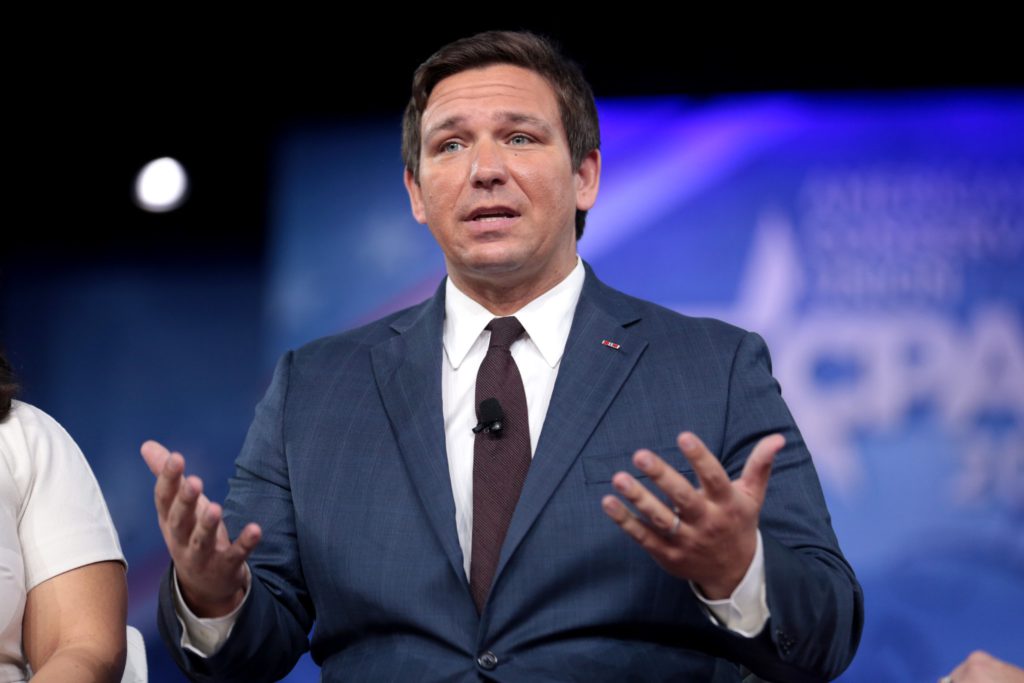Since Republicans have been in charge of state government since 1998, and seem likely to continue their streak, campaign donations flow in substantial amounts. Over the past decade, Republican donors contributed at least 70% of the total money raised in Florida election campaigns.
Suppose Republicans retake control of the House in the midterm elections, as polls indicate likely. In that case, Florida will have a chapter highlighting how hundreds of millions of dollars spent on state and federal candidates these past few years helped strengthen right-wing control in the Sunshine State.
Florida may be the best diploma Republicans have to demonstrate how a swing state with a historically divided vote, which began in 2016 with Donald Trump’s campaign, to reduce the distance from Democrats so much so that for this election, there are more registered Republican voters than in any other year since records have been kept.
Over the past decade, Republican donors contributed at least 70% of the total money raised in Florida election campaigns, making some of them the most expensive in the country in both midterm and presidential elections, according to data the Itempnews Project compiled from various research groups that provide data on money in U.S. politics.
After the Supreme Court in 2010 dismantled a rule that limited the number of money corporations, unions, associations, and individuals spend to support or oppose political candidates, money to parties has had a powerful impact on U.S. elections regarding determining a winner. In the case of Florida, there are no limits on how much a person or corporation can donate to a political action committee (PAC).
The Itempnews Project compiled data from the Federal Election Commission (FEC), OpenSecrets, and At Transparency USA, two nonprofit watchdog groups that track money in politics, to trace how Republicans, thanks to influential donors fueled since 2000 the party’s rise within Florida, pumping tens of millions of dollars from their national funds into the Sunshine State.
In the last 25 years, the Florida Democratic Party raised $352 million, while the Republican Party raised $668.1 million.
Due to the backing of national and local conservative millionaires in the insurance, finance, real estate, and casino industries, Republicans have secured Florida’s power, unlike Democratic candidates who receive major donations from law groups, lobbyists, state public sector unions, having to rely upon, at the last minute, on injections of national money to boost their elections.
The Itempnews Project found that most of Florida’s Fortune 500 companies have been regular donors to Republicans, which helps to understand some of the long-standing policies of Republican governors in the state opposing regulations that benefit these corporations.
For years, the Republican Party of Florida has been, behind Maine, the second largest recipient of contributions from the Republican Governors Association, according to OpenSecrets data.
In some Congressional and Senate races, super PACs and other Republican outside groups spent more than their candidates, which as of 2010, positioned Florida as one of the states in the nation with the highest volume of general election spending.
Marco Rubio, the Republican senator from Florida seeking his third six-year re-election bid on November 8, won his first seat in 2010. That year he became the third candidate in the country to raise and spend the most money to win a U.S. Senate seat. Since then, his party spared no funds to make both state’s senators Republican, a goal they accomplished in 2018.
Florida Democratic congressional representative Val Demings, who is seeking to unseat Rubio and become the state’s first black senator, has raised more money than her opponent, $72 million to $46 million, according to the latest data available, making her Senate race the third most expensive in the country this election cycle.

However, in this election, Democrats are more focused on saving incumbent candidates in office than taking a “long shot” at a victory regarding Demings’ campaign in Florida. In September, the polls showed a timid advance of the congresswoman over Rubio. As of October, everything changed, and the Republican looks solid to win with a majority on November 8.
Perhaps this explains why neither Senate Democrats’ super PAC nor their official campaign arm, the Democratic Senatorial Campaign Committee, had spent much of anything in the last reports to the Federal Election Commission., The New York Times reported in late October.
More money, more power
How the Republicans have stained, Florida red has been exceptional. Not only because, at the local level, they have also controlled both houses of the legislature since 1998 or because, in recent years, the party has also won symbolic victories in significant cities and virtual elected offices. Nevertheless, there has been a gradual retreat of the Democrats and their big financiers, frustrated with losing money in a competitive state that does not give them results.
In fact, for this election, big money from outside donors dried up almost entirely for Democrats in Florida, according to a Politico report. New York billionaire Michael Bloomberg contributed only $1.5 million to the party when in 2020, he pledged $100 million to Florida to help Joe Biden defeat President Trump.
But if Bloomberg, former mayor of New York City, or Soros Fund Management founder George Soros are the Democratic financial hopefuls in Florida, during several elections, Republicans have counted on juicy direct donations to Floridians from major national conservative figures like Miriam and Sheldon Adelson, hotel and casino industry magnates, Kenneth Griffin, the billionaire hedge fund investor and CEO of Citadel, or Robert Bigelow, a Las Vegas real estate mogul and founder of Bigelow Aerospace, who is known for his beliefs in UFOs and paranormal events.
The real estate industry, insurers, lawyers and lobbyists, casino owners, business associations, and healthcare professionals have been significant donors to Florida Republicans, with at least 40% of the party’s total fundraising.
Those same industries, both locally and nationally, are now driving the re-election of Governor Ron DeSantis by pumping in so much money that the campaign broke the all-time fundraising record for a governor.
“Many interest groups, PACs, lobbyists, and wealthy individuals want to access and influence the majority party in Tallahassee so they will have a better chance at getting their preferred laws, regulations, and policies adopted. Since Republicans have been in charge of state government (both the legislature and the executive branch) since 1998, and seem likely to continue their streak, campaign donations flow in large amounts to Republicans,” said Aubrey Jewett, a political scientist and associate professor at the University of Central Florida.
Since 2014, with President Barack Obama in the White House, Republicans have increased contributions to their federal candidates in Florida. That year, 62% of campaign spending in the state was taken by the Republican party when they managed to conquer the Senate and expand their majority in the House of Representatives, data from the Federal Election Commission show.
According to Reuters, the 2018 victory of Rick Scott, Florida’s millionaire outgoing governor, who competed for the Senate, gave Republicans control of the state’s upper house seats for the first time since the 19th Century. Scott received donation checks that year for $87.6 million. By contrast, Bill Nelson, the Democrat who had held the seat since 2010, raised $32 million.
Scott’s has been the most expensive Senate campaign in Florida’s history and the second most expensive in the nation, a plush position held by Rubio since 2010.
From 2017 through last September, state-level candidates of both parties in Florida raised $608.5 million, of which $430 million came from Republican donors, according to a Transparency USA database.
These amounts are understood because of Florida’s strategic value. That is where 29 electoral college votes come from; it is an ethnically diverse territory where Hispanics represent some 2.5 million electors, in addition to its extensive geography as the third most populated state in the nation.
Florida v. Florida
While George W. Bush won Florida twice, and so did Obama, both did so by narrow margins. However, since 2016 there has been a sign of the rightward swing in the Sunshine State by the way Trump won there by 1 point in 2016 and 3 points in 2020, recalled Richard Lowry, editor-in-chief of the conservative National Review and a contributor to Politico Magazine, in an op-ed column.
DeSantis’ re-election was a given for much of this year’s campaign season, according to RealClearPolitics polling. Not only because the Republican has become a rising star within his party but because of his enormous ability to raise funds in and out of the state, being seen as a top-tier Republican presidential candidate in 2024.

DeSantis has run in six races for public office since 2012, winning five of them. In his entire political career, he has raised about $275 million, OpenSecret data show, but this re-election campaign has secured him more money than ever. While in 2018, he raised $60.1 million to become governor, as of October 2022, he had $195 million to keep the office, nine times more than his Democratic challenger for governor, Charlie Crist.
DeSantis’ re-election campaign has been endorsed by at least 42 billionaires and members of billionaire families, the Sarasota Herald-Tribune reported. The donors come from 15 states, and 17 endorsed DeSantis in 2018.
“Finally, yes, the money factor has been a major reason why Republicans have won so many of the last few close elections and one of the reasons Democrats are losing influence. Money is not the only reason a candidate or party wins an election. However, it is one of the most important resources, and the party or candidate who raises and spends the most money wins most elections,” added Professor Jewett.
The Republican cash flow in Florida comes not directly from local donors, the data show, but from national industry groups and conservative millionaire families from different states around the country responding to the committees’ call for help in boosting prominent candidates.
The Adelson’s, the hotel and casino industry moguls, have been the top individual Republican donors in Florida, followed by traditional party donors such as the Orlando-based Walt Disney Co. entertainment company; Blue Cross Blue Shield of Florida, the insurance company; or the U.S. Sugar Corporation, the nation’s largest sugar cane producer based in Clewiston, Fla.
Disney is Florida’s most significant employer through its Walt Disney World theme park and resort in Orlando. However, after the company said it would work to repeal the “Parental Rights in Education Act,” which critics call “Don’t Say Gay.” Desantis canceled Disney’s independent special districts; Republicans feared the money would stop flowing, but the party is one thing, and the governor is another.
For the 2022 election cycle in Florida, the company has donated $605,000, primarily to benefit the Florida Republican Senatorial Campaign Committee, according to At Transparency USA. In March, Disney announced it would stop making campaign donations in the state following controversy over parental rights legislation.
The tilt toward a more conservative Florida in recent years may be rooted in many factors. The one that political strategists and academics agree on is that Republicans set their sights on conquering the state and may have succeeded.
Republicans would like to see Florida become a reliable Republican “Red State” rather than a purple one “because they want to see their conservative policies passed, not have to spend so much money in the future to win elections, and have Florida contribute to Republican presidential electoral votes, control of the U.S. Senate and House, and continued dominance in Tallahassee,” Professor Jewett said.


